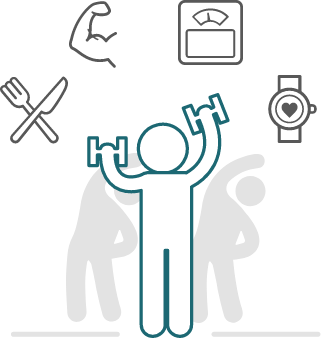

Staying healthy with HIV may start with keeping your
viral load low, but there's more to it.
Exercise
We all know we need to exercise, but for people with HIV it can be even more important. Know why you need to exercise. Exercise can:
- help you keep “muscle mass,” which people with HIV can lose
- keep your bones strong to avoid osteoporosis—a weakening of the bones
- reduce stress and help you sleep. Sleep is important, because it helps your body rebuild
- boost your energy level
TIPS FOR WORKING OUT:
- before you head to the gym, talk to your healthcare provider about what exercise program is right for you
- find a workout partner to help you get going and stick to the program
- be sure to listen to your body. If it’s in pain or tired, it’s okay to take a break

Eating healthy and HIV
It's very important for people with HIV to eat healthy, and to also be careful eating certain foods.
A well-balanced diet provides nutrients from a variety of sources, including:
- Protein (fish, meat, and legumes) builds muscles and a strong immune system
- Carbohydrates (fruits, grains, starches, and sugars) give you energy
- Healthy fat (like olive oil or fat in avocado) is good for extra energy
- Supplements like vitamins and minerals add nutritional value
- Water helps you avoid dehydration and stay healthy
Food safety for people living with HIV
Because people living with HIV may be at greater risk for food-borne illness, they should protect themselves by following these tips:
- Don’t eat raw eggs, raw meats, or raw seafood
- Wash fruits and vegetables thoroughly before eating them
- When cutting up raw meats to cook, use a separate surface
- Put leftover cooked foods into the refrigerator right away after eating meals
- Always wash your hands and cooking tools with soap
- Ask your healthcare provider if there are any foods you shouldn’t eat with the medication you’re taking
HIV and weight loss
HIV can lead to losing weight without wanting to. Foods rich in protein and calories may help you increase and keep a healthy weight. Of course, don’t eat foods you’re allergic to, and talk to your healthcare provider before changing your diet. Here are some foods that can help:
- Peanut butter
- Legumes (dried beans and peas)
- Dairy foods like pasteurized cheese and cooked eggs
- Instant breakfast drinks and milkshakes
Water safety
Water that’s not filtered can have bacteria, viruses, and parasites in it that people with HIV should avoid. Remember these 2 tips:
- Never drink water from outdoor sources, like lakes, rivers, or streams
- If you’re traveling to a place where the water safety isn’t guaranteed, drink water only from a sealed bottle, and avoid ice
Mental & emotional health
- Finding out you’re HIV-positive and living with HIV can lead to conditions like depression and/or anxiety. But these conditions can be treated, and lots of people get better
- Don’t ignore your emotional and mental health—find a counselor through your healthcare provider or ASO Professional
- Ask your ASO Professional to connect you with a support group or peer counselor—someone who’s also HIV-positive
Download this brochure for information on mental health.
Sexual health
- Taking HIV medicine as prescribed and practicing safe sex by using condoms can help prevent someone who is HIV-positive from transmitting it to another person who is not HIV-positive
- Some people think if both partners have HIV, they don’t need to use condoms. Not true. One person can have a different kind of virus—one that’s harder to treat
- STIs (sexually transmitted infections, like herpes) can be more dangerous for someone with HIV, whose immune system is weak
- Get tested for STIs at least once a year. It is important to treat an STI immediately if you have one
As part of living healthy:
- Go in for regular CD4+ T-cell and viral load tests
- The best way to find out if your HIV is under control is to keep appointments with your healthcare provider for regular lab testing, usually once every 3–6 months. This will include checking your CD4+ T-cell count and viral load. Remember, your CD4+ T-cell count should be as high as possible, and your viral load should be as low as possible.
- The best way to find out if your HIV is under control is to keep appointments with your healthcare provider for regular lab testing, usually once every 3–6 months. This will include checking your CD4+ T-cell count and viral load. Remember, your CD4+ T-cell count should be as high as possible, and your viral load should be as low as possible.
- Keep track of your side effects
- If you’re having trouble dealing with any side effects, you may not have to accept them as “just the way it is.” It’s important to let your healthcare provider know. If you’ve reached undetectable, and are experiencing side effects, think about creating a new treatment goal for yourself to discuss with your doctor.
- If you’re having trouble dealing with any side effects, you may not have to accept them as “just the way it is.” It’s important to let your healthcare provider know. If you’ve reached undetectable, and are experiencing side effects, think about creating a new treatment goal for yourself to discuss with your doctor.
- Another part of staying healthy?
- Staying informed
- The more you know about your HIV medicine—and whether it may be time to consider another—the better. Your healthcare provider is a good source of information.
NOT SURE IF YOU’RE EXPERIENCING SIDE EFFECTS?
Download our side effects checklist.
Find HIV resources in your area.
HVUWCNT

